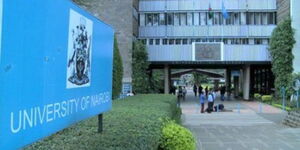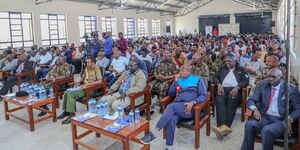Newton Owino, one of Kisumu's fastest rising entrepreneurs, can trace his new found success to a walk along a dumpsite filled with fish waste and birds of prey.
Having graduated with a degree in leather chemistry from an Indian University and no job in sight, Owino decided to follow a flock of birds that were hovering around the Kisumu International Airport.
His act was fueled by curiosity as well a general need to pass time, only for him to find the one thing that would end up change his life forever.
The smelly fish waste was intoxicating and foul, but Owino saw an opportunity to put his university knowledge to use.
“I immediately concluded that with the knowledge I had, I could turn the waste into a source of economic advantage for myself and others by creatively exploring the free raw material," he narrated during a past interview.
His first step was to convince the National Environment Management Authority (NEMA) that his venture would not only be viable but environmentally friendly as well.
NEMA and Kisumu County Government authorities were blown away by his proposal, giving way to the birth of Owino’s Alisam Development Product and Design Industry located at Kajulu on the outskirts of Kisumu City.
He quickly went about identifying and training Kisumu locals on best practices and he was soon raking in millions.
The 40-year-old businessman turns fish scales and other waste into useful products for the local and the export market.
“We export tanned fish skin mainly to Europe and some African countries and use it locally to make shoes, jackets, designer women’s handbags, drums and belts," he revealed.
Interestingly, 'waste' is not a word that exists within Owino's establishment. Fish intestines are tanned to get strings that are used to make ladies’ sandals, the discarded bones are boiled into glue for binding
Whatever remains of the flesh is then scraped off to make chicken and other animal feeds.
Fish factories around Kisumu produce close to 150,000 tons of fish waste yearly.
Following his runaway success, Owino started the Kisumu Leather Dealers Association to help him qualify for Small and Medium Enterprise (SME) loans from the Kenya Industrial Estates (KIE).
Apart from shoe makers scattered around Kisumu City who are reliant on his fish leather product, at least 300 local women who collect and clean the fish remains plus 17 employees are also making bread through his revolutionary company.
15 years down the line and Owino is creating market opportunities for 80 local farmers who supply the leather factory with a range of sustainable products, such as papain, a papaya extract used as a leather softener, and bleaching agents and dyes made from moringa, hibiscus and other locally grown plants.
“Our philosophy is to make as much use of locally available products as possible and to create market opportunities for low-income groups in the community,” he explained.
Owino is one of estimated 100,000 entrepreneurs and small- and medium-sized enterprises that have received support from the European Union-funded SWITCH to Green Initiative.
{"preview_thumbnail":"/files/styles/video_embed_wysiwyg_preview/public/video_thumbnails/3n_ZP1ZYVgw.jpg?itok=8vqDZLeX","video_url":"","settings":{"responsive":1,"width":"854","height":"480","autoplay":0},"settings_summary":["Embedded Video (Responsive)."]}












